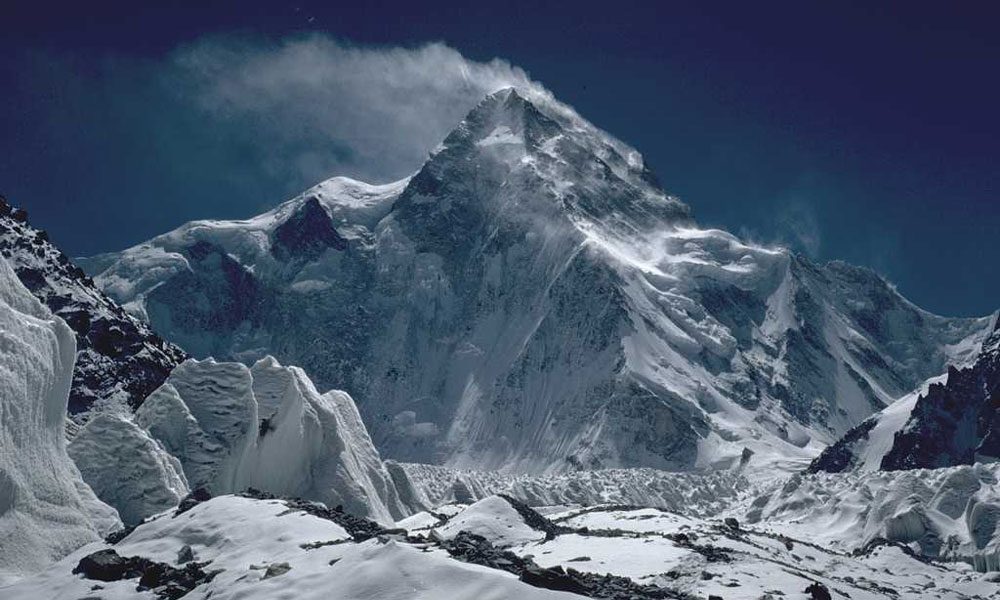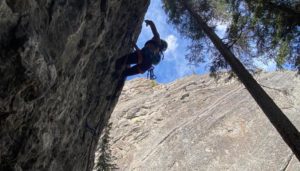Beyond Sacredness, Into Greed
"It is rare to find anyone who openly writes about greed in climbing, but the late climber, author and archaeological enthusiast David Roberts wrote candidly of 'greedy happiness' and 'crude greed'"

Nine years ago, the Lama or Ripoche of Tengboche Monastery – his spiritual home within view of Chomolungma/Everest – was interviewed in Kathmandu. With reluctance and humility, Ngawang Tennzin Norbu spoke directly to climbers in the Himalayas. He said:
“As more foreigners come to climb, the snow is melting, and the mountains are turning black. As base camp becomes polluted, avalanches and water are destroying things all over the world. Storms are causing destruction. There is a lot of talk about mountains. You think and say that climbing mountains is good, that you will gain something from it. But climbing mountains is also a form of greed. We must protect the world. We can’t say stop, so we must reduce. When the mountains are black take a sacred vessel and make offerings. This can fix broken places. If we want peace we have to reduce our greed.”
Greed, that old chestnut, has been sitting in the hills for an exceptionally long time. As far back as 1345, the Italian poet Petrarch refers to greed after an early ascent of Mont Ventoux in Provence, France: “A fiery longing draws me…towards the great and loftiest peak.” His motive — “to see what so great an elevation had to offer” — may seem trite and anachronistic to some climbers today who may tally success on the abacus of difficulty or speed. It is shocking to compare Petrarch’s motives and awe at the summit — “I stood like one dazed” — to the puerile and self-indulgent antics of 10 tourists (two Canadians among them) who stripped and urinated on the summit of Mount Kinabalu in Malaysia in 2015.
Their “fery longing” for high altitude antics offended Malaysians of the Sabah’s Kadagan Dusun tribe who regard the summit as a sacred place, a resting place for the souls of their ancestors. And if Petrarch’s innocent desire for the summit informed a meditation on the state of his soul, the tourists on Kinabalu jiggled their junk for phones to be uploaded instantly into the digital universe.
These two climbing experiences are separated by 700 years, and if Petrarch’s desire to climb seems private and directed inward, then the frat party on Kinabalu was public and outward. And when the gap-year vandals came down from the peak, they too “stood dazed” at the airport when they were charged with public indecency and threatened with both fines and a prison term. One English father pleaded with the government not to make his “disrespectful” daughter an example of Malaysian justice. A mere week later, a magnitude 6 earthquake killed 18 Malaysians in the Kinabalu area, and further reinforced tensions between these two disparate events. Some locals, however, attributed the cause of these deaths to the disrespectful behaviour of the tourists.
Increasingly, I have the unpleasant feeling that greed needs no justification, and no apologist to defend its interest. Greed is as natural to us as the very air we breathe, and almost as invisible. There are natural limits as to how tall a redwood tree can grow, or how long a blue whale can live, but there are precious few limits on how much wealth we can amass, how much pollution we can create, and how much exploitation we can live with. Even pinning down a firm definition of greed among any group of friends or colleagues—is as difficult as pushing a string uphill, and probably a lot less fun. Most people I spoke with walk a circular argument and politely steer clear of any judgments, claiming that desire is natural, and greed is simply excessive desire, and no one has the moral right or authority to impose their view of what excessive means to anyone else.
We generally applaud CEOs, the ambitious go-getters who pluck the early worm and amass one small fortune, three houses, six bathrooms and nine cars. Very few go out on a limb and say they are greedy. Instead, we claim, they are successful. And like taxidermied heads mounted on a wall, many of us will myopically accept these trophies of desire and greed as legitimate status symbols of nature and human nature.
Even when it cannot be satiated, desire, greed and attachment die hard. In a fever grip of topophilia for the canyon country of Utah, Edward Abbey wrote in 1967, “Standing there gaping at this spectacle of rock and cloud and sky and space, I feel a ridiculous greed come over me. I want to know it all, posses it all, embrace the entire scene intimately, deeply, totally … mine by right of possession, possession by right of love.” Abbey was no climber, in fact, he eschewed climbing with ropes and hardware as mere “engineering exercises,” yet he speaks with the familiar urgency, lust and zeal many climbers feel, including myself.
Sitting uncomfortably in my car at the base of Shiprock in Arizona ince: after climbing for five weeks in the desert, my lower back was a wilderness of tired muscles, herniated discs, and tender nerves. But as I sat slouched over the steering wheel, there it was before me, the crenellated volcanic plug rising out of the Navajo country just waiting to be pare explored and summited. I knew it was forbidden to do so by tribal law, d”— and I was in no fit state, but did that diminish my desire to possess it?
Given permission, given passage, given physiotherapy and strong medication, I would have delighted in climbing Shiprock by any route. A wiser person would have observed me in a state of destructive materialism, and dangerously out of balance. A wiser and more compassionate heir person would have understood that many experiences will be unsatisfactory; they would have told me that one more climb, one more experience, one more fix that trip wasn’t the answer to my climber’s greed.
Tibetan scholar Robert Thurman in Circling the Sacred Mountain d if 1999) describes a circumbulation of Mount Kailash in Tibet. During the the walk he discusses with his students the difficulties of touching ear upon issues related to Abbeyian possession, Petrarchian longing, and ort plain old Shiprock style greed when teaching Buddhist practice: “If you put the self-addiction on the table right away, challenging basic narcissism at its root, people may react and feel that their very personality ice. is threatened. Their addictive self convinces them that the teaching is in an assault, you the teacher are the enemy and that the habitual self is still their best friend. So, Buddhist teachers usually skirt the issues of self-habituation and self-preoccupation initially.” Thurman, however, refuses to skirt the issue, coddle, or soft sell his view: “We have made all life vulnerable to the impact of our ignorant prejudice, greed, and hate.”
When I hear Thurman’s words, I can see wizened Ngawang Tenzin Norbu nodding his head in agreement. But others may enthusiastically disagree. Like my father, they may rage against the suggestion that a single gas-powered lawnmower has anything to do with the global climate crisis. Many might regard climbing as the antithesis of greed while living in a car on a shoe-string budget while camping under boulders and forgoing showers. I have done this myself and took pride in my voluntary asceticism, my light footprint, my non-attachment to the vulgar excesses of the west. And if someone like Buddha Bob Thurman or a Tibetan lama in the 198os would have hinted that I was greedy, I suspect I would have defended my lifestyle choice with little grace and less insight.
Climbers and other athletes might regard themselves as our culture’s last “holy men” or people. In The String Theory (1997), the late David Foster Wallace suggests this may be possible when he wrote: “Holy men: they give themselves over to a pursuit, endure great pain and privation to actualize themselves at it, and enjoy a relationship to excellence and perfection that we admire and reward and like to watch, even though we have no inclination to walk that road ourselves. In other words, they do it for us, and sacrifice themselves for our redemption.”
In that light, it may be easier to reframe a mythic climber such as George Mallory (who died on Everest in 1924) as a holy man/warrior destined to victoriously summit Everest or come home dead on his shield. Mallory did neither, but what really killed him (and many others) on Everest and other peaks and walls spanning the globe? Was it altitude, hypothermia, oedema, bad luck or a fall, or was it dedication, passion and addiction? These ideas are not difficult to swallow, passion and dedication almost sound virtuous. But what of greed? Could plain and simple greed be the root cause of his and so many other deaths in climbing?
It is rare to find anyone who openly writes about greed in climbing, but the late climber, author and archaeological enthusiast David Roberts wrote candidly of “greedy happiness” and “crude greed,” whether he was bagging peaks in Alaska or canyoneering in Utah in search of Anasazi dwellings sitting precariously on canyon walls. In his 1997 book, In Search of the Old Ones, he writes about the “crude greed of the pothunter with infantile lust to own something priceless.” Although he did not stop exploring, Roberts was able to turn a Ihurmanesque corner and understand that the exquisite archaeological finds were better left uncollected and undocumented in their climate controlled desert environment.
I was recently at a bouldering area where I saw a younger climber attempting a problem called The Crab. He was moving fluidly on the opening traverse, but an awkward mantle kept throwing him off balance and down onto the white cobbles below. He repeatedly launched his wiry torso and limbs at the crux with the same results. His mother recognized me as a fellow enthusiast and asked for advice about her son. “Does he ever rest?” I asked. She shook her head meaning no.
“Is he often upset when he doesn’t climb a problem,” I asked. She said, “Yes, he’s like a tiger.” Between the tears, I tried to console the young climber and said, “Wow, that looks like a hard move. Maybe if you took a good rest you would get it.” I then asked him if he rested in the gym. The kid said, “No, I am a tiger.” Before walking away and trying to restore my own internal balancing act of desire and greed and peace, I shook the kid’s hand. “Hey, even tigers need rest.”


